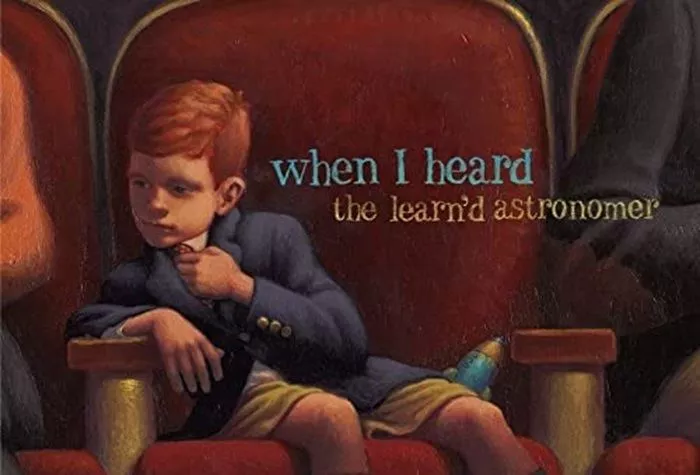Welcome to Poem of the Day – When I Heard the Learn’d Astronomer by Walt Whitman.
Walt Whitman’s poem When I Heard the Learn’d Astronomer is a timeless piece of literature. It reflects the poet’s unique perspective on the beauty of the natural world and its contrast with the structured approach of science. Written in 1865, this brief yet profound poem belongs to Whitman’s celebrated collection Leaves of Grass. In eight lines, Whitman masterfully conveys his feelings about how humans perceive and interact with nature. This article will explain the poem’s meaning, themes, and the poet’s intent.
When I Heard the Learn’d Astronomer Poem
When I heard the learn’d astronomer,
When the proofs, the figures, were ranged in columns before me,
When I was shown the charts and diagrams, to add, divide, and measure them,
When I sitting heard the astronomer where he lectured with much applause in the lecture-room,
How soon unaccountable I became tired and sick,
Till rising and gliding out I wander’d off by myself,
In the mystical moist night-air, and from time to time,
Look’d up in perfect silence at the stars.
When I Heard the Learn’d Astronomer Explanation
Summary of the Poem
The poem narrates a personal experience. The speaker attends a lecture by a “learn’d astronomer,” who explains the cosmos using charts, graphs, and calculations. Despite the applause from the audience, the speaker feels overwhelmed and disengaged. He quietly leaves the lecture hall and ventures outside into the open night. There, in the peaceful stillness, he looks up at the stars and feels a deep connection to their beauty.
Themes in the Poem
Science vs. Experience
The poem contrasts the scientific understanding of the universe with the personal, emotional experience of nature. While science focuses on facts, measurements, and analysis, Whitman suggests that a deeper connection to the stars can be achieved through direct observation and quiet contemplation.
The Power of Nature
Whitman celebrates the raw, unfiltered beauty of nature. The speaker finds solace and wonder in the simplicity of looking at the stars without needing explanations or calculations. This theme reflects Whitman’s belief in the spiritual and emotional power of the natural world.
Individuality and Intuition
The speaker’s decision to leave the lecture room highlights the importance of personal choice and intuition. By stepping away from structured learning, he embraces his unique way of experiencing the stars. This aligns with Whitman’s broader philosophy of self-reliance and individuality.
Structure and Style
The poem is written in free verse, which is characteristic of Whitman’s style. It lacks rhyme or a fixed meter, allowing the natural flow of thoughts and emotions. This structure mirrors the speaker’s journey from the rigid environment of the lecture room to the boundless expanse of the night sky.
The use of sensory imagery, such as “mystical moist night-air,” creates a vivid and immersive experience. The poem’s tone shifts from frustration to peace, reinforcing the speaker’s transformation as he connects with nature.
Symbolism in the Poem
The Learn’d Astronomer
The astronomer symbolizes structured knowledge and the intellectual approach to understanding the world. His “proofs” and “diagrams” represent the technical aspects of science that can sometimes feel detached from the beauty of what they explain.
The Stars
The stars symbolize the vastness and mystery of the universe. They evoke awe and wonder, serving as a reminder that some experiences transcend human understanding.
The Lecture Room and the Night Air
The lecture room represents confinement and the limits of intellectualism, while the night air symbolizes freedom and a direct connection to the natural world.
Message of the Poem
The poem encourages readers to balance intellect with intuition. While science and knowledge are valuable, Whitman argues that we must also take time to experience the world in its pure, unmediated form. By stepping outside and embracing the beauty of the stars, we can rediscover our connection to the universe.
Conclusion
When I Heard the Learn’d Astronomer is a beautiful reflection on the relationship between knowledge and experience. Walt Whitman reminds us that while learning has its place, there is immense value in stepping back and simply observing the world around us. The poem’s timeless message continues to inspire readers to appreciate the wonders of nature and the importance of personal connection to it.

